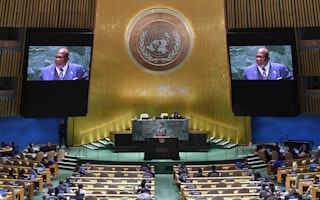For a Just Recovery, Reform Sovereign Debt
By Julie McCarthy & Vanessa Jimenez

COVID-19 delivered a blow to the global economy unlike any since the Great Depression. As the pandemic shuttered entire industries and economies, more than 495 million jobs were lost around the world. As a result, the World Bank projects that as many as 150 million people will fall into extreme poverty this year.
Not all have borne the costs of the pandemic equally. While the world’s poorest have seen their incomes drop by $3.7 trillion, the world’s billionaires have increased their wealth by $3.9 trillion.
The only option for many governments has been to borrow at an unprecedented scale. And yet, many countries are in no place to accumulate more debt. Even before the pandemic, 64 low-income countries were already spending more to service their international debts than on strengthening their local health and education systems.
Absent a reprieve, Angola alone would spend more than $5 billion on debt service in 2021—enough to purchase vaccine doses for nearly half the entire continent.
Over the next two to three years, we will see a number of low-income countries default, and many more low and middle-income countries take on unsustainable additional debt loads that will continue to thwart their access to capital markets and decrease their funding on essential public services and climate action, right when it is most urgently needed.
This vicious cycle—debt leading to default leading to draconian cuts in public services leading to more debt—has laid bare the dysfunction and injustice of the current global financial architecture.
Key challenges underpinning the current debt crisis include opacity around sovereign debt deals, predatory lending by private creditors, and the lack of common rules and expectations around equitable and sustainable sovereign debt restructuring.
Unless a more just and effective path to recovery emerges and the global debt architecture is reformed, we can expect to see more human suffering. The United States treasury secretary, Janet Yellen, recently warned of the risk of a “permanent divergence” in the global economy in the years to come, between the prosperity of high-income countries, and the debt-burdened lower- and middle-income countries.
There is also the risk that increased relief to debt-distressed countries is squandered, rather than used to boost support for essential services and to take advantage of a historic opportunity for green transformation.
All this presents both a challenge and a once-in-a-lifetime opportunity for the Open Society Foundations and our partners: an opportunity to help expose the architecture’s shortcomings, to demonstrate the efficacy of new approaches, and to create an enabling environment in debt-distressed countries for the emergence of a just and green recovery.
To that end, Open Society is launching a concerted campaigning initiative that includes both a focus on short-term gains, as well as moves to target the root causes of poverty and injustice embedded in the international financial architecture.
In the short term, we seek the allocation of additional Special Drawing Rights financing to soften the blow of the crisis for the poorest and generate emergency liquidity for countries in distress. The campaign will support work to ensure that richer countries donate their portion of this allocation to more vulnerable countries. At the same time, we support guardrails to help ensure financing is spent more accountably, as well as mechanisms to help advance a just and green recovery.
We will also focus on root causes. For example, we will support work that begins to address the inequities of sovereign bankruptcy that give unfair rewards to private creditors at debtors’ expense. In particular, the campaign will focus on mechanisms that expose and limit the greed of private creditors that prey on vulnerable countries and divert taxpayer dollars to enrich the private sector at the expense of public budgets needed for essential public services. Toward this end, we will support efforts that enhance debt transparency, opening the door to a new, more accountable architecture that better serves people and the planet.
Ultimately, we seek to stimulate a broad set of inclusive and rights-based reforms, while freeing up resources for more resilient and sustainable economies that are better matched to face the existential challenge of climate change.

Until November 2021, Julie McCarthy was co-director of the Open Society Economic Justice Program.
Vanessa Jimenez is a special advisor for Advocacy at the Open Society Foundations.


